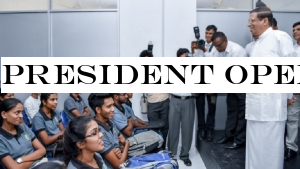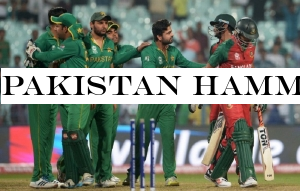Music
Trailers
DailyVideos
India
Pakistan
Afghanistan
Bangladesh
Srilanka
Nepal
Thailand
StockMarket
Business
Technology
Startup
Trending Videos
Coupons
Football
Search
Download App in Playstore
Download App
Best Collections
Srilanka

The Arab News reported Saturday that Saudi government has increased the Hajj quota for Sri Lankan pilgrims by adding 500 visas to the existing number, bringing the total to 4,000 from this year, Azmi Thassim, the islandambassador in Riyadh, .
- Details
- Category: Srilanka
Read more: Sri Lanka’s Hajj quota increases by Saudi Arabia
Write comment (90 Comments)
What will our descendants make of how we acted in 2019? The world faces multi-generational challenges like climate change, poverty or antibiotic overuse. But for much of the time, our eyes remain locked on the present. Each news cycle brings a moment or event that consumes all of our attention, even if its effects are ultimately transient.
We live in an age of pathological short-termism
At the Hay Festival this year, BBC Future brought together three thinkers from the worlds of philosophy, politics and science to discuss what it might take to lengthen our perspective & and reconsider the well-being of future generations.
&We live in an age of pathological short-termism,& said philosopher Roman Krznaric, who is writing a book about long-term thinking. &Politicians cannot see beyond the next week, and nations bicker around conference tables, focusing on near-term interest while the planet burns.
&We treat the future like a distant colonial outpost devoid of people where we dump our ecological degradation, risk, nuclear waste and public debt.&
Should tomorrow's generations have more rights? (Credit: Getty Images)In many ways, Krznaric continued, we are trampling on the rights of young people & now and tomorrow & to live a healthy and happy life.
&I used to be a political scientist and it never once occurred to me that we disenfranchise future generations in the same way we disenfranchised slaves and women in the past. We give them no political power, no political voice,& he said.
Arguably, part of the solution to short-termism lies with our leaders: asking politicians to act with horizons far beyond the next election. Sophie Howe, the future generations commissioner for Wales, spoke about how her role involves embedding longer-term thinking into government. It all began with a piece of political legislation in 2015 called the Well-being of Future Generations (Wales) Act.
&It applies to all of our public services. Health boards, local authorities, national bodies, and really significantly the Welsh government themselves have to demonstrate how they are taking decisions which meet today's needs without compromising the ability of future generations to meet their needs,& Howe said. (Read more about reinventing democracy and politics for the long-term).
DEEP CIVILISATION
This article is part of a BBC Future series about the long view of humanity, which aims to stand back from the daily news cycle and widen the lens of our current place in time. Modern society is suffering from &temporal exhaustion&, the sociologist Elise Boulding once said. &If one is mentally out of breath all the time from dealing with the present, there is no energy left for imagining the future,& she wrote.
Thatwhy the Deep Civilisation season is exploring what really matters in the broader arc of human history and what it means for us and our descendants.
Beyond politics, are there better ways of thinking about the future? Lord Martin Rees, author of the book On The Future and co-founder of the Centre for the Study of Existential Risk, spoke about the notion of &cathedral thinking& & the idea that we need a multi-generational approach to the grand challenges we face.Centuries ago, people started to build cathedrals knowing that they wouldn&t be finished in their own lifetimes, he explained.
The puzzling thing, Rees said, is that these cathedral builders probably had much shorter horizons into the future than we do. Today, we have the mental capabilities to imagine the Big Bang all the way through to the end of the Solar System. &It seems paradoxical that we would have these much broader horizons in time and space but are more short-term, but there is a reason,& he explained.
Medieval cathedral-builders expected their descendants to have essentially the same life as them, with the same needs and desires. Not so for us.&We have no idea what the lives will be like for our children and grandchildren,& Rees said. It is the dizzying pace of change in modern society that makes it so hard to think longer-term & but that doesn&t mean we should not try.
- Details
- Category: Srilanka
Read more: Future: How to think longer-term
Write comment (92 Comments)
I will not allow to sign any foreign agreement which is a challenge to the countryindependence and sovereignty or not suitable to the country with any world power during my tenure, President MaithripalaSirisena stressed.Although there are discussions in the society about agreements such as SOFA and Millennium Challenge and a land act which is not suitable to the country, I will leave no room to sign such detrimental agreements, President Sirisena further said.
- Details
- Category: Srilanka
Read more: President not allows to sign any agreement which is detrimental to the country
Write comment (94 Comments)
Several spells of light showers will occur in the Sabaragamuwa and Western provinces and in Galle and Matara districts. Mainly fair weather will prevail elsewhere. Strong gusty winds up to 60 kmph are likely in Northern Province. Fairly strong gusty winds up to 40 kmph are likely in North-central province and in Trincomalee, Hambantota and Matale districts.
- Details
- Category: Srilanka
Read more: Fair weather with strong gusty winds
Write comment (98 Comments)
The Monaragala District Career Guidance Center established under the Smart Sri Lanka Career Guidance Network Project was declared open by President MaithripalaSirisena yesterday (06). Smart Sri Lanka Career Guidance Institute, a project implemented by the Presidential Secretariat under the guidance of the President has been set up with the objective of bring together all the career development institutes and resources in order to find a sustainable solution to the issue of unemployment in Sri Lanka through a well-advanced mechanism.
- Details
- Category: Srilanka
Read more: President opens Smart Sri Lanka Monaragala District Office
Write comment (92 Comments)
Highlights: Pakistan beat Bangladesh by 94 runsICC Men's Cricket World Cup, Lord'sPakistan 315-9 (50 overs): Imam 100, Babar 96; Mustafizur 5-75Bangladesh 221 (44.1 overs): Shakib 64; Shaheen 6-35Pakistan won by 94 runsScorecard;Group table;Schedule.Pakistan hammered Bangladesh by 94 runs at Lord's but failed in their highly unlikely task of pipping New Zealand to the last World Cup semi-final place.
The 1992 winners needed victory by a record margin of at least 308 runs to finish fourth on a better net run-rate.
An Imam ul-Haq century and 96 from Babar Azam saw them post 315-9 before they dismissed Bangladesh for 221.
Shakib Al Hasan top-scored with 64 for the Tigers but seamer Shaheen Afridi (6-35) produced a match-winning spell.
Pakistan could not reach the semi-finals once Bangladesh reached 8-0 in the second over of their chase, confirming New Zealand in the last four with Australia, India and England.
England will finish third and New Zealand fourth, with the group winners to be decided on Saturday.
Leaders Australia will top the group if they beat South Africa at Old Trafford (13:30 BST) - but if the defending champions lose, India can overtake them by winning against Sri Lanka at Headingley (10:30).
World Cup group tableRank Team P W L T NR RR Pts1 Australia (Q) 8 7 1 0 0 1 142 India (Q) 8 6 1 0 1 0.811 133 England (Q) 9 6 3 0 0 1.152 124 New Zealand (Q) 9 5 3 0 1 0.175 115 Pakistan 9 5 3 0 1 -0.43 116 Sri Lanka 8 3 3 0 2 -0.934 87 Bangladesh 9 3 5 0 1 -0.41 78 South Africa 8 2 5 0 1 -0.08 59 West Indies 9 2 6 0 1 -0.225 510 Afghanistan 9 0 9 0 0 -1.322 0Watch the best moments as Shaheen-inspired Pakistan beat BangladeshFinal to be shown on free TV if England qualifyIs the end near for Dhoni and India?Pakistan win but fail to pull off a 'miracle'Realistically, Pakistan knew their tournament was all but over before a ball was bowled at headquarters, even though captain Sarfaraz Ahmed said: "If Allah helps then miracles can happen."
There remained the smallest of chances a record-breaking one-day international victory could see them sneak into the semi-finals on net run-rate.
The minimum score they needed to stand any theoretical chance was 308, but even that would have meant Bangladesh needing to be bowled out for nought.
In the end, they stuttered their way to 315-9, despite Imam and Babar providing the platform with their 157 partnership off 151 balls for the second wicket.
But when the latter was dismissed hit wicket a ball after recording his seventh one-day international century, 246-2 in the 42nd over was perhaps not fully capitalised upon.
Watch Mustafizur's 'amazing' reaction catchImad Wasim (43) did launch a counter-attack with some lusty blows despite striking skipper Sarfaraz on the arm at one stage, forcing him to retire hurt.
Ultimately, neither that nor the injury would cost Pakistan, with the wicketkeeper able to resume his innings off the last ball, before adding a catch and a stumping in the field.
Shaheen's figures were both his first five-wicket haul in ODI cricket and the best figures by a Pakistan bowler in a World Cup match.
The 19-year-old left-armer had Shakib caught behind and then removed the lower order with a series of fast yorkers to claim the best figures of the tournament so far.
He is one of a number of impressive young players in this Pakistan team, including Imam, 23, leg-spinner Shadab Khan, 20 and 24-year-old Babar, who could be key members of the side as they build towards the next World Cup.
All-rounder Shoaib Malik, 37, confirmed he will now retire from ODI cricket, although he will continue to play in Twenty20s.
'That's got to hurt' Pakistan skipper hit on elbow by team-mateTigers' roll comes to a haltBangladesh came to this World Cup as dangerous underdogs and caused a couple of upsets along the way.
But amid memorable victories against South Africa and West Indies, defeats such as this, where standout individual performances have lacked support, have been disappointing.
Here Mustafizur Rahman took 5-75 to become the second-highest wicket-taker at the tournament on 20 behind Australia's Mitchell Starc with 24.
Then with the bat, Shakib reinstated himself at the top of the run-scoring charts on 606 with his seventh score of 50 or more in this competition, including two centuries, which equalled Sachin Tendulkar's record for India from 2003.
Their coach Steve Rhodes, the former Worcestershire and England wicketkeeper, will no doubt take the positives from their victories - but will also be aware what might have been in some of their closer-fought defeats.
Watch teen Shaheen take six wickets for Pakistan'Net run-rate needs to be looked at' - reactionPakistan coach Micky Arthur: "I do feel net run-rate needs to be looked at. One really poor game and you're really battling to recover.
"I'd like it to be number of wins and then head-to-head and then net run-rate in the future that determines places when points are level."
Pakistan captain Sarfaraz Ahmed: "Unfortunately we played very good cricket in the last four matches but we have not qualified.
"Only the one match will cost us in the whole tournament (the heavy defeat by West Indies). We played very good cricket. The way we responded after India, we played very well in all three - batting, fielding and bowling.
"The way Shaheen is bowling is very good. Today it was one of the best bowling performances I have seen in a long time."
Bangladesh captain Mashrafe Mortaza: "The whole team is disappointed, but on the other hand with the way we've played, we could've finished higher in the table.
"A few things have been very good, but others have not been very good. Little things in games do make a huge difference."
On Shakib Al Hasan's performances in the World Cup: "He has been absolutely brilliant in this tournament and I feel sorry for him that the team have not been able to back up those performances.
"I think he has put in one of the best performances in the history of this World Cup and hopefully next time the boys will step up with him."
- Details
- Category: Srilanka
Read more: Pakistan hammer Bangladesh but New Zealand into semi-finals
Write comment (97 Comments)Page 308 of 392

 6
6




